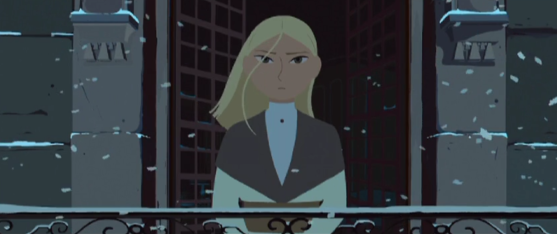
I’ve heard the liltin at oor yowe-milkin,
Lassies a-liltin before break o day
Now there’s a moanin on ilka green loanin –
The Flooers o the Forest are a’ wede awa
. . .
We hear nae mair liltin at oor yowe-milkin
Women and bairnies are heartless and wae
Sighin and moanin on ilka green loanin –
The Flooers of the Forest are a’ wede awa
From “The Flooers of the Forest” (read in full and/or listen to the song here.)
At the center of Terence Davies’s new film, Sunset Song, adapted from Lewis Grassic Gibbon’s 1932 book of the same title, is a wedding. It is a modest affair, a barn for its stage, humble farming folk its participants. It is a celebration of love, a communal joyful gathering, a candle-bright warm pocket in the middle of a dark, snowy New Year’s Eve. And when the bride, Chris Guthrie (Agyness Deyn), sees the barn, prepared by her friends, she says, delighted, “It is like a picture book.” And it is.
In the midst of the merriment, the company calls for a song from the bride, and she sits at their center and sings. It is a sunset song, glowing in the deep colors of grief for the day that has gone, a song for the dead, a song of mourners. It is “Flooers of the Forest,” traditionally a tune played by pipers to commemorate those Scots lost in battle. A strange choice, it might seem at first, for a wedding, but a choice that gets at the heart of this story, this place, this people, and at the heart of Chris herself. A mournful song is itself a thing of intrinsic paradox: the beauty of its words or music sit, impossibly, within the grief. The song might seem, to a strictly literal mind, to devalue the grief by the very beauty, and yet it is not a devaluation. The grief itself is more grievous, the deeper the beauty of the song. And so such a song defies the intellect, bowing to mystery. Continue reading “SIFF 2016: Sunset Song (Terence Davies, 2015)”










